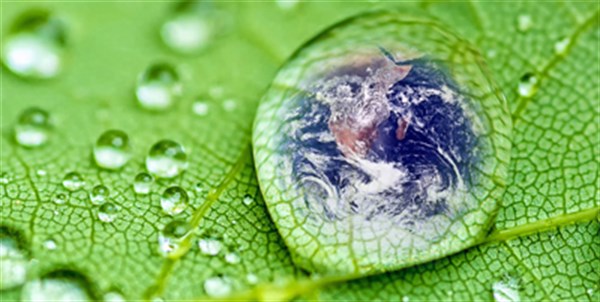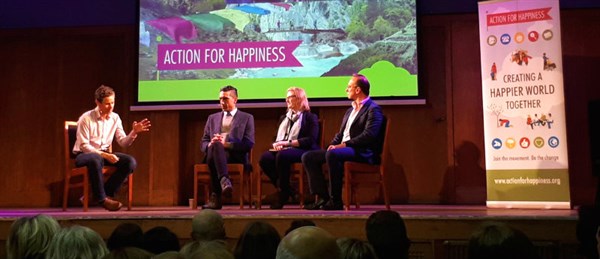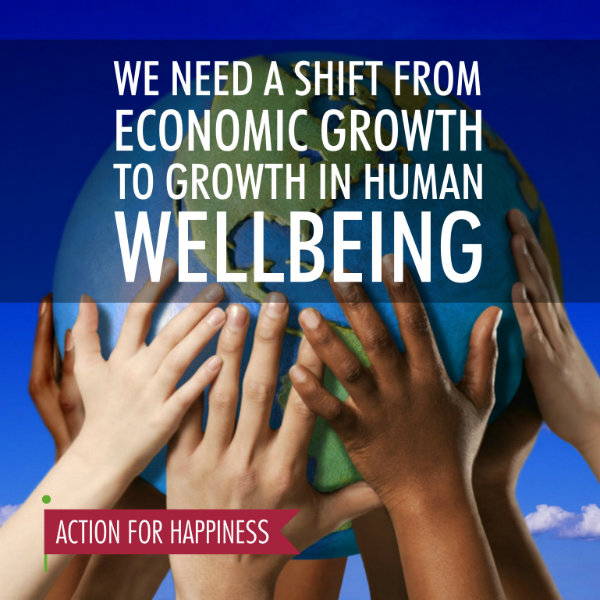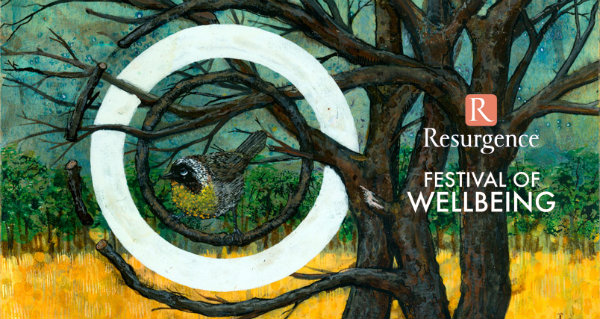Happy Person, Happy People, Happy Planet
31 Aug 2017 | Satish Kumar

A new, inclusive and holistic concept of wellbeing is
coming to the fore, embracing sustainability, resilience, fairness,
care for the Earth and all living beings.
The true meaning of 'wellbeing' has often been very narrowly
interpreted and misunderstood. It has been associated with personal
growth and personal development; a search for job satisfaction,
work/life balance, more time for yoga, walking, gardening and
resting. But this view is changing.
Radical ecologists are now proposing a decrease in economic
output, a reduction in material consumption, the setting of limits
to our use of non-renewable resources, and an increase in the
growth of human wellbeing and the wellbeing of planet Earth.
The commitment of governments across the globe to the singular
goal of growth in Gross Domestic Product (GDP) is being questioned
and a new understanding is emerging. Economists, industrialists and
policymakers are realising that GDP is not enough and nor is it a
guarantee of a good society. For many seemingly wealthier
countries, GDP has moved exponentially upwards but the health and
happiness of the population have fallen. At the same time the
stress on our natural resources has increased out of all proportion
(peak oil is only the tip of the iceberg).
Wellbeing is being taken
seriously
In recent years, a number of excellent initiatives have been
founded demonstrating that this topic is now being taken very
seriously. Cambridge University's Well-being Institute was established for the
scientific study of wellbeing and the Happy Planet
Index was set up by the New Economics Foundation (NEF). The Action for
Happiness charity is now playing an increasingly pivotal role
in promoting positive social change.
The government of Bhutan's initiative to measure Gross
National Happiness (GNH) in place of Gross National Product
(GNP) has started to inspire governments in the West that haven't
had the courage to challenge the orthodoxy of GNP. European
politicians are now talking about the need to focus on wellbeing
and the influential World Happiness Report is now in its fifth
year of publication, edited by influential economists such as Jeff
Sachs and Richard Layard.

These are all good starting points. A shift of emphasis from
exclusive attention to economic growth, high living standards,
social mobility and materialism to a politics of wellbeing is very
welcome.
How authentic is this shift from
economic growth to growth in wellbeing?
The establishment is very good at hijacking or even stealing the
words of the green movement and then carrying on with 'business as
usual'. For example, the word 'sustainability' is often used both
by politicians and business leaders, but when we then examine their
actions and practices it is difficult to believe that they have
understood the meaning of the word.
It appears they want to have their cake and eat it: they wish to
achieve sustainability without disengaging themselves from the
causes of 'unsustainability' such as globalisation, the free
market, mass transportation and deep-sea oil exploration.

The truth is that if they wish to embrace wellbeing they will
have to be more honest about it and turn away from their clear
commitment to unlimited economic growth and the religion of
materialism.
The interdependence of
Wellbeing
Wellbeing is not merely an extrinsic value: it is an extrinsic
and an intrinsic value at the same time. It is, in the long term,
impossible for an individual to be happy when others are suffering
from starvation, social injustice and wars. Also, how can an
individual be healthy on an unhealthy planet? Health of the person
and health of the planet are two sides of the same coin.
Individuals and communities live in a seamless web of
relationships. If those relationships are flourishing, individuals
and communities will flourish. If the web of relationships is in
turmoil, there can be no tranquillity, no harmony in the lives of
individuals, their families or their communities. Wellbeing is as
much a spiritual value as it is an economic necessity.

If we suffer from fear, anxiety, greed, anger, craving and
selfishness, then wellbeing will remain a distant goal. But if we
cultivate compassion, courage, caring, gratitude and humility, then
wellbeing will be near at hand. Psychological wellbeing is a first
step to social and environmental wellbeing, but without social and
environmental wellbeing, psychological wellbeing will remain a
distant dream.
We are happy only when we make others happy - it is a seamless
process. If the forests are gone, if biodiversity is diminished, if
water is polluted, if cruelty is inflicted on animals, then there
can be no personal peace or social coherence. If human communities
are damaged because of poverty and deprivation, then they will be
forced to encroach more upon natural resources. Therefore social
justice is an essential part of wellbeing.
So the big vision of wellbeing - which we will be exploring at
the fifth Resurgence Festival of Wellbeing in London on
Saturday 23rd September - is that it must be a personal, social and
ecological whole: Happy Person, Happy People, Happy
Planet!

Satish Kumar is a peace and environmental
activist and Editor Emeritus of Resurgence & Ecologist magazine.

The Resurgence Festival of Wellbeing takes place on
Saturday 23 September, 10am-6pm, at St James's Church, Piccadilly,
London W1J 9LL, featuring leading speakers, change-makers and
performers. Festival tickets cost £45/£35 Concessions.